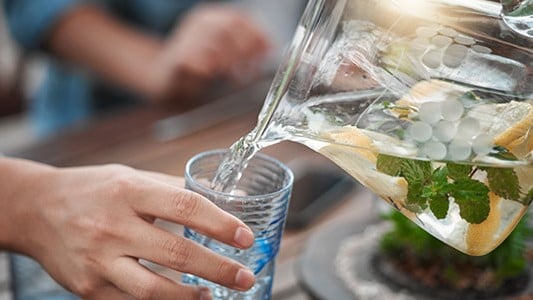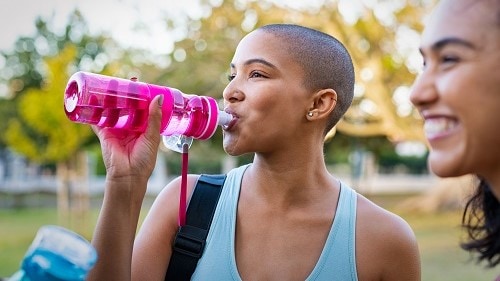Key points
- Getting enough water every day is important for your health.
- Drinking water can prevent dehydration and helps the body function normally.
- See tips for drinking more water throughout the day.

Benefits of drinking water
Getting enough water every day is important for health. Drinking water can prevent dehydration, which may cause unclear thinking, mood change, overheating, constipation, and kidney stones. Water has no calories, so replacing sugary drinks with plain water can help reduce caloric intake.
Water helps your body:
- Keep a normal temperature.
- Lubricate and cushion joints.
- Protect your spinal cord and other sensitive tissues.
- Get rid of waste through urination, perspiration, and bowel movements.
Your body needs more water when you are:
- In hot climates.
- More physically active.
- Running a fever.
- Having diarrhea or vomiting.
Meeting your water intake every day
Daily water intake recommendations vary by age, sex, pregnancy status, activity level, and breastfeeding status. Daily water intake is mostly from water and other beverages. Foods, especially those with high water content such as many fruits and vegetables, can also add to fluid intake.

Tips to drink more water
- Carry a reusable water bottle with you.
- Freeze water in freezer-safe bottles for ice-cold water all day.
- Choose water over sugary drinks.
- Opt for water when eating out.
- Serve water during meals.
- Add a wedge of lime or lemon to your water.
Healthier drink options
Many other beverages can be part of healthy eating patterns.
Low- or no- calorie beverages
Plain coffee or teas, sparkling water, seltzers, and flavored waters are low-calorie choices.
Drinks with important nutrients
Low-fat or fat-free milk; unsweetened, fortified milk alternatives; and 100% fruit or vegetable juice contain important nutrients. Enjoy these drinks within recommended calorie limits.

Other beverages
Sugary drinks: Regular sodas, fruit drinks, sports drinks, energy drinks, sweetened waters, and sweetened coffee and tea contain calories but little nutritional value. Learn how to Rethink Your Drink.
Alcoholic drinks: If you choose to drink alcohol, do so in moderation.
Caffeinated drinks: Moderate caffeine consumption (up to 400 mg per day) can be a part of a healthy diet. That's about 3 to 5 cups of plain coffee.
Drinks with sugar alternatives: Drinks that are labeled "sugar-free" or "diet" likely contain high-intensity sweeteners, such as sucralose, aspartame, or saccharine. These sweeteners may reduce caloric intake in the short term. However, there are many questions about the sweeteners' effectiveness for long-term weight management.
Energy drinks: In addition to added sugar, these products may also contain large amounts of caffeine and other legal stimulants. Concerns have been raised about the potential health risks of these products, especially for young people.
Resources
Frequently asked questions about drinking water
Increasing access to drinking water and other healthier beverages in early care and education settings
